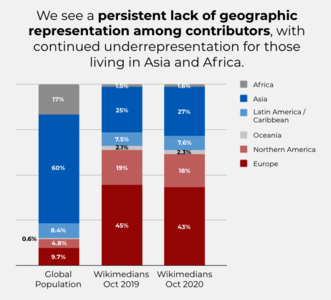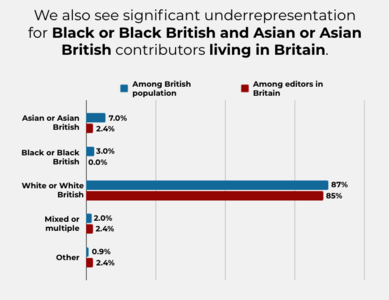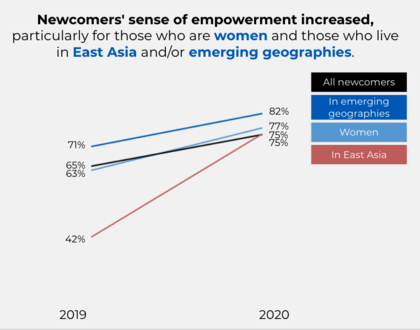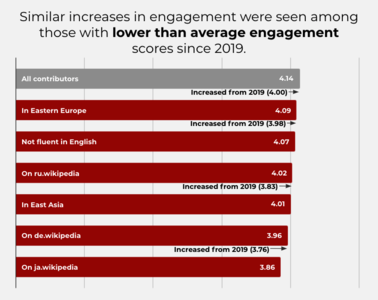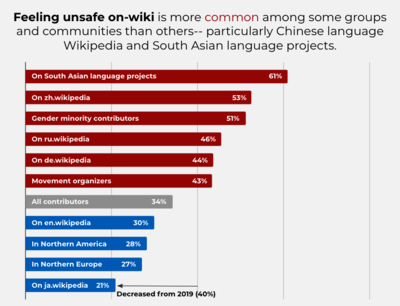Community Insights/Community Insights 2021 Report/Thriving Movement
Co-creating, growing, and cultivating a safe and welcoming, diverse, sustainable, and thriving movement of leaders, contributors, advocates, and partners for free knowledge.
The Wikimedia Foundation is committed to building and supporting a movement that represents the world, fosters a safe and inclusive environment, and is self-sustaining. Each year, the Community Insights survey measures our progress towards these goals.
Community and Newcomer Diversity
[edit]As seen in previous years, people living in Asia and especially Africa were dramatically underrepresented among Wikimedia contributors. In contrast, contributors in Europe and Northern America make up a disproportionate majority of Wikimedians (see Figure 5). Just as in 2019, the 2020 data shows us that newer contributors were more than two times more likely to live in Africa or Asia than more tenured contributors. This year, they were also more than four times as likely to live in Latin America or the Caribbean than their more tenured counterparts.1 However, a comparison of 2019 and 2020 contributors (see Figure 6) suggests that the movement still struggles to retain editors who live outside Europe and Northern America. We found no increase in the proportion of newcomers living in Africa, Latin America, or Asia over the last year. In addition, the only differences among tenured contributors over the last year were an increase in the proportion of editors living in Europe and a decrease for those living in Northern America. Both attracting and retaining editors from diverse geographies needs to be a continued priority for a Thriving Movement.2
-
Figure 5: Wikimedia monthly active contributor data comes from geoeditor analytics data. Global population comes from the most recent country-level population estimates. Geographic classifications use UN definitions for continental and subcontinental breakdowns.
-
Figure 6: Newcomers are defined as Wikimedians who began contributing in the two years preceding data collection; tenured contributors are those who started more than two years prior.2
Similarly, newcomers continue to be more representative of some socioeconomic diversities than more tenured editors, but we found no evidence that such diversity has improved over the last year. Unlike the previous year, newcomers were no more likely to live outside a metropolitan area than more tenured contributors. Also, while newcomers were still more likely than more tenured contributors to be under the age of 25, the proportion of newcomers under 25 years of age fell from 37.3% (2019) to 27.2% (2020). Newcomers were still less likely to have completed a post-secondary degree (75.8%) than their tenured counterparts (88.7%), but due to a change in the question we use to measure education we are not reporting any changes in contributor education over time in this report.3

While women were still underrepresented among contributors, we found a small but significant increase in the proportion of contributors who are women since 2019 (See Figure 7). As in 2019, newcomers were more likely to be women in 2020 than tenured contributors. However, the last year also saw growth in the proportion of tenured women contributors and of women contributors overall. Women contributors made up 11.5% of Wikimedians in 2019 and 15.0% in 2020; among tenured contributors, this proportion rose from 9.0% to 12.6%.4 At least in the last year, the attraction of women to the movement appears stable, and retention of women editors has improved.4 We detected growth in the proportion of women, particularly among contributors living in Latin America and the Caribbean (9.3% to 22.7% women) and in Northern America (12.8% to 22.1%), as well as among editors under the age of 45 (11.1% to 15.5%).5 In 2020, 2.6% of contributors identified as transgender or non-binary, with no statistically significant change in proportion from 2019. The proportion of men among contributors fell from 86.5% in 2019 to 83.7% in 2020, also not a statistically significant difference.6
In the United States, white editors were overrepresented among Wikimedians. This year, we asked contributors about their race or ethnicity for the first time, though we did so only among those living in the United States and Great Britain (see Figures 8 and 9). In the United States, both Black and Hispanic or Latino/a/x people were severely underrepresented in our communities, while white and Asian American editors were overrepresented. In Great Britain, we found underrepresentation for Asian or Asian British editors as well as Black or Black British editors. Racial and ethnic distributions of editors in these two countries largely map to trends in economic privilege and race or ethnicity in each locality. While this information is concerning, it establishes an important baseline as we try to expand the diversity and inclusion of Wikimedia spaces beyond geography and gender.7
-
Figure 8: The reported race and/or ethnicity for US-based editors in comparison with the US population. 2020 was the first year we collected such data. Because the survey allowed respondents to select multiple racial or ethnic categories, the percentages shown here do not total 100%.7
-
Figure 9: The reported ethnicity for Britain-based editors in comparison with the British population. Because the survey allowed respondents to select multiple ethnic categories, the percentages shown here do not total 100%. The ethnic category "Mixed or multiple" includes respondents who self-identified in an open field as "Mixed" instead of selecting multiple ethnicity options.7
Newcomer Empowerment and Support
[edit]Newcomers' feelings of empowerment remained modest but did improve since 2019, including among some groups who indicated low empowerment in 2019. Based on an index of six measures (see Figure 118), the average empowerment score for all newcomers increased from 3.65 to 3.83 over the last year (see Figure 10).9 The specific measures where we found an increase within the index score were the ease of learning editing policies and understanding the rules for editing content.9
Most notably, both newcomers in East Asia and those who are women--groups who had significantly lower feelings of empowerment than others in 2019--saw significant increases in feelings of empowerment over the last year. In 2019, editors in East Asia had an average empowerment score of 3.36 and women of 3.50, compared with 3.65 for newcomers overall. These averages rose to 3.78 and 3.83, respectively, and this year no statistically significant difference was found between these groups' empowerment and other editors in 2020. We also found an increase in newcomer empowerment among contributors living in emerging geographic areas more generally (see Figure 10).9
-
Change in overall newcomer empowerment over time and for contributor groups (for whom a statistically significant difference over time was found at the 0.05 level.)9
-
Figure 11: Newcomer empowerment index items, as well as change since 2019 for items with a significant change since over time at the 0.05 level.8
Where we did find group differences in newcomer empowerment, some echoed what was found in 2019, with higher average empowerment among contributors to the Spanish Wikipedia (4.23), those living in Latin America or the Caribbean (4.14), and those under the age of 25 (3.96) when compared to others. While we did not detect changes since 2019 for these groups, we did detect lower newcomer empowerment scores for the first time among contributors to Wikimedia Commons (3.38) and those living in Western Europe (3.60).10
Community Belonging and Engagement
[edit]
Survey respondents answered several questions about how much they feel they belong in the Wikimedia movement, as well as their sense of engagement—that is, how much they enjoy and intend to continue contributing—in Wikimedia projects. While average feelings of engagement still tend to be more positive than feelings of belonging, both indices improved somewhat since 2019 (see Figures 12 and 13).
Overall sense of movement belonging increased from 3.50 to 3.70 from 2019 to 2020. Among contributors living in East Asia and those contributing to the Japanese language Wikipedia, feelings of belonging remained lower on average than among other contributors. However, these scores also increased for those groups since 2019, especially for ja.wikipedia.org contributors. As in the previous year, those living in South Asia as well as movement organizers, on-wiki administrators, and past event participants had higher belonging scores, with a statistically significant increase since 2019 for event attendees. We detected higher feelings of belonging among those living in West Asia for the first time (See Figure 12).11
Movement engagement also increased overall in the last year (from 4.00 to 4.14). It remained higher than average for event attendees, movement organizers, editors of the Spanish language Wikipedia, and contributors living in Africa (see Figure 13). Editors of the French language Wikipedia, as well as those in Southern Europe and Latin America or the Caribbean, all showed increased engagement since 2019 as well as higher engagement when compared to other contributors in 2020.12 Other groups, as in 2019, continued to show lower than average engagement than others, including contributors to the Japanese, German, and Russian language Wikipedias, as well as those contributors not fluent in English. This year, we also detected lower than average engagement for the first time among those living in Eastern Europe and East Asia. Even so, small increases in engagement over time were detected among those in Eastern Europe and contributors to the German and Russian Wikipedias (see Figure 14).13
-
Figure 13: Average feelings of engagement for all contributors and for groups whose average scores were found to be higher than other contributors to a statistically significant degree. This graph also indicates where these groups saw a statistically significant change in engagement scores between 2019 and 2020. Analysis of all contributors weighted by editing activity and home wiki, analyses of all group comparisons weighted by editing activity.12
-
Figure 14: Average feelings of engagement for all contributors and for groups whose average scores were found to be lower than other contributors to a statistically significant degree. This graph also indicates where these groups saw a statistically significant change in engagement scores between 2019 and 2020. Analysis of all contributors weighted by editing activity and home wiki, analyses of all group comparisons weighted by editing activity.13

Movement Leadership
[edit]Members of Wikimedia communities exercise leadership in a number of ways, including as movement organizers who organize projects, events, or groups; as well as serving in on-wiki administrative roles. The Wikimedia Foundation committed in its 2019 Medium Term Plan to support strong and empowered movement leadership.
As in 2019, movement organizers were in many ways more representative of global diversities than other contributors, while those in on-wiki administrative roles more closely mirror or magnify the often-disproportionate demographics of the broader movement (see Figure 15). Movement organizers were more likely to be women than other contributors, as well as more likely to be transgender or non-binary. They were also more likely to live in Africa or South Asia than the general Wikimedia community, and less likely to live in Europe (50.6%) than other contributors (59.2%).14
As last year, there were few differences between the geographic representation of on-wiki administrators and other contributors. However, they were still more likely to live in South Asia than non-administrative contributors.15


No statistically significant changes were found for on-wiki admins' empowerment over the last year. Again, administrators indicated high levels of empowerment (overall score of 4.07 out of 5), with the vast majority agreeing that they know how to handle challenges in their on-wiki roles, that they can address such challenges in a way they find appropriate, and to a lesser extent that they have the resources needed to address such challenges (See Figure 16). This year, no demographic differences in feelings of empowerment were found.16
However, we did find some year-over-year changes for movement organizers when we asked about their satisfaction with the resources available to them. Overall empowerment for organizers rose from 3.64 (out of 5) in 2019 to 3.78. The only individual indicator where we detected an increase was in satisfaction with funding availability, although organizers were still less satisfied than other resourcing areas (See Figure 17).17 As last year, organizers living in Africa had higher average empowerment scores, and for those organizers empowerment had also increased overall since 2019. Also similar to 2019, those living in Asia had lower empowerment than organizers elsewhere.18
Similar to on-wiki administrators, about three quarters of movement organizers agree that their community or affiliate provides sufficient support to plan and execute their projects, but far fewer indicate having received this support from the Foundation (see Figure 18). While the proportion of leaders feeling support from the Wikimedia Foundation is low, it is higher for some groups. Organizers in emerging geographies (73.1%) and in Africa (83.7%), as well as admins in Asia (73.0%) or who are under 25 (65.0%), were all more likely to indicate that the Foundation provides the support they need, whereas organizers in Western Europe, as last year, were less likely to say so (47.9%).20 A greater proportion of organizers reported having support from their affiliate or community than did so in 201919, and this increase since 2019 was seen especially among organizers who are women (84.9% favorable in 2020) and who live in emerging geographies (81.5%).21 In 2020, admins living in Asia were more likely to report support from their communities (93.2% favorable), whereas organizers living in that region were less likely to report community support (68.7%), as were those organizers not fluent in English (50.0%).21

Safe and Secure Spaces
[edit]The Wikimedia Foundation is committed to promoting safer and more civil spaces, as well as reducing disparities in experiences of harassment by Wikimedians with diverse gender identities.
Over one-third of all contributors surveyed indicated that they had felt unsafe or uncomfortable in an online Wikimedia space in the last year, and there was no statistically significant change since 2019 (see Figure 19). As was the case last year, contributors living in Northern Europe were less likely to say they had felt unsafe, whereas contributors to the German and Chinese language Wikipedias continue to be more likely to say so. We detected an increased likelihood of feeling unsafe for the first time this year among contributors to South Asian language projects or the Russian language Wikipedia, contributors who are transgender, nonbinary, or members of another gender minority, and among movement organizers.22
Feeling unsafe was less likely among contributors to the Japanese Wikipedia, who were almost half as likely to report such feelings as they were in 2019. While contributors in Northern America and to the English Wikipedia were less likely than other contributors to report such feelings, among each of these groups women contributors were more likely than others (39.6% in Northern America, 42.3% on en.wikipedia) to say they had felt unsafe.22 Unlike last year, we found no evidence that women experienced less comfort or safety overall.
-
Figure 19: Contributors reporting feeling unsafe or uncomfortable in Wikimedia spaces.22
-
Figure 20: Contributors experiencing harassment in Wikimedia spaces.23

We also found no overall change in reported rates of harassment among contributors since 2019. While English language Wikipedia contributors were less likely to feel unsafe, they were again this year more likely to report experiencing harassment, as were movement organizers and contributors living in Oceania. Those in Southern Europe were less likely to say they had been harassed (see Figure 20).23 We did detect a change in reported rates of harassment among some groups (see Figure 21). Among women and contributors to Wikidata, we saw sizable increases in reported harassment, though this change over time may be in part due to a change in measurement since 2019 which also led to lower "I'm not sure" responses among these groups in 2020. Increases in harassment among contributors living in both Asia and Europe over the last year were less likely to be explained by a difference in measurement.24

